Learn the debated moment of man's creation in the Bible, and explore the rich layers of this theological mystery.
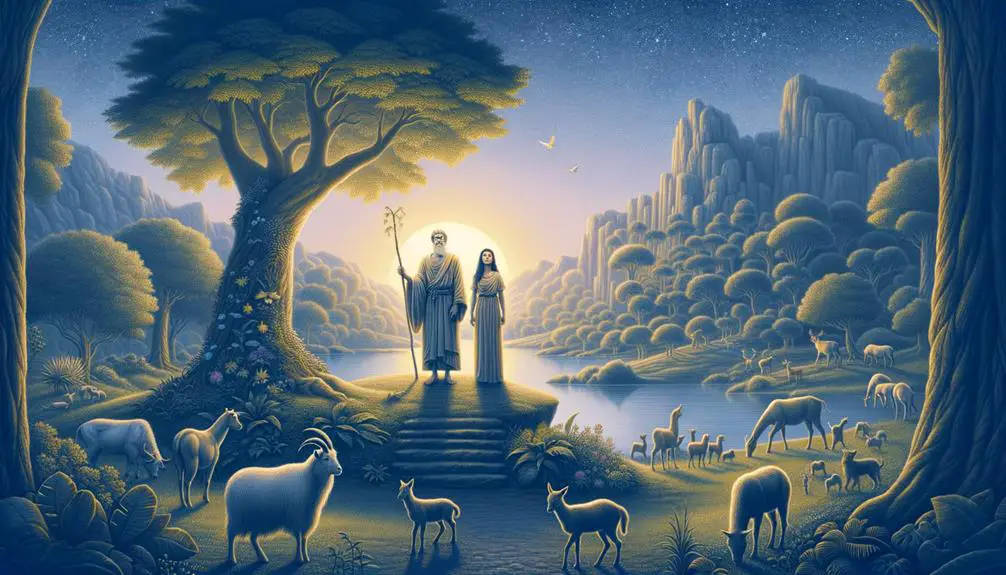
When Was Man Created in the Bible
Have you ever wondered exactly when man was created according to the Bible?
The answer isn't as straightforward as you might think. Amidst the poetic verses of Genesis, the creation of man is placed on the sixth day, yet interpreting this moment has sparked centuries of debate among scholars and theologians.
You'll find that understanding the historical context, analyzing biblical text, and considering various scholarly perspectives can significantly deepen your appreciation of this pivotal event.
Let's embark on a journey to uncover the layers of meaning behind this question, exploring its theological implications and significance for believers today.
Key Takeaways
- Man was created on the sixth day of the Creation Week according to Genesis.
- The creation of male and female suggests notions of equality and partnership.
- Being created in God's image imbues humans with unique value and purpose.
- Ancient traditions and scholarly debates offer varying interpretations of the exact timing.
The Creation Week Overview
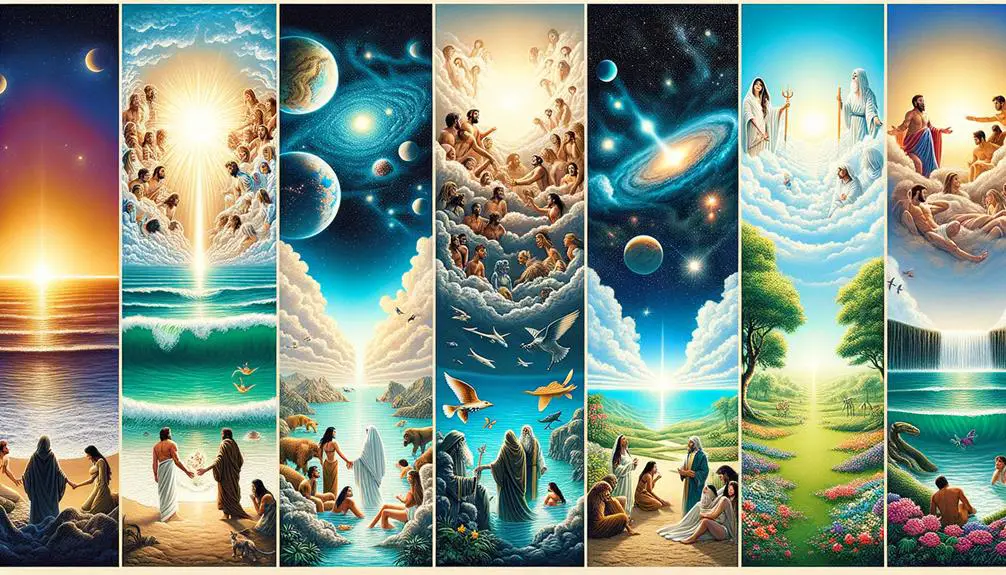
The Creation Week, as outlined in the Bible's Book of Genesis, presents a sequential account of the universe's formation, culminating in the creation of man on the sixth day. This narrative starts with a formless void and progresses through a series of divine interventions that establish the cosmos as it's known. Key components of this account, such as the daylight sequence and vegetation growth, are pivotal in understanding the chronological framework and the methodological approach taken by the divine in the biblical story of creation.
Analyzing the daylight sequence, you observe that it sets the stage for life by establishing a cyclical pattern of night and day. This division is crucial for the later stages of creation, particularly for vegetation growth and the sustenance of life forms introduced in subsequent days. The introduction of light on the first day, prior to the creation of the sun on the fourth day, underscores a non-literal interpretation favored by many scholars. This sequence suggests a structured approach to creation, where light, a fundamental element, precedes its natural sources, indicating a planned progression rather than a spontaneous emergence.
Vegetation growth, initiated on the third day, marks the first instance of life in the Creation Week. This step is significant for several reasons. Firstly, it demonstrates a move from inanimate to animate, setting the groundwork for more complex life forms. Secondly, the specificity with which different types of vegetation are mentioned—seed-bearing plants and trees—highlights an intention for sustainability and reproduction. This foresight underlines the interconnectedness of creation, where each element plays a role in supporting subsequent forms of life, leading up to the creation of man.
Interpreting the Sixth Day
Having explored the foundations laid by the initial days of creation, let's now examine the significance of the sixth day when, according to the Bible, humans were meticulously crafted. This day marks not just the culmination of creation but introduces elements with profound genetic implications and ecological consequences.
- Genetic implications: The creation of humans on the sixth day highlights a momentous event, suggesting a divine blueprint for human genetics. This act implies a unique genetic makeup, setting humans apart from other creations. The narrative suggests an intentional design, potentially influencing our understanding of human genetics in a theological context.
- Ecological consequences: The command given to humans to 'have dominion' over the earth and its creatures sets the stage for the human role in the ecological system. This stewardship implies a responsibility towards the environment, hinting at the ecological balance that humans are meant to maintain.
- Societal structure: The creation of humans, male and female, on the same day hints at an inherent equality and partnership within the societal structure. This equality is foundational to the biblical understanding of human relationships and society.
- Spiritual significance: The creation of humans in God's image on the sixth day holds deep spiritual significance, indicating a special connection between the divine and human. This relationship underscores the unique position of humans in the creation narrative, with implications for morality, ethics, and spirituality.
Biblical Text Analysis

Delving into biblical text analysis offers a meticulous examination of the nuanced language and literary structures that frame the creation of humans on the sixth day. You'll find that the linguistic patterns and cultural influences play a significant role in understanding the narrative. The original Hebrew text uses specific terminology and syntax to convey not just the act of creation but also the significance and purpose behind it. This precision in language highlights the importance of humans in the creation narrative, setting them apart from the rest of creation.
Analyzing the text, you'll notice the repetition of phrases and the use of parallelism, a common Hebrew literary technique. This not only emphasizes certain points but also enhances the narrative's poetic quality. Furthermore, the cultural influences of the time are embedded within the text. The account mirrors the worldview and theological concepts prevalent in ancient Near Eastern societies, yet it also diverges to present a unique monotheistic perspective on creation.
The creation of humans, as depicted in Genesis, is layered with theological implications. The text suggests that humans are created in the image of God, imbuing them with inherent value and purpose. This concept, revolutionary at the time, sets the foundation for subsequent theological and ethical discussions.
Historical Context
Understanding the historical context surrounding the creation of man in the Bible necessitates examining the Ancient Near Eastern environment in which these texts were composed.
You'll find that biblical creation narratives weren't created in isolation but were influenced by the cultures and cosmologies of neighboring civilizations.
Exploring chronological interpretations further clarifies how these narratives have been understood through time, offering insight into their evolving significance.
Ancient Near Eastern Context
To fully grasp the biblical account of human creation, it's essential to examine its roots within the broader tapestry of Ancient Near Eastern civilizations. The narratives found in the Hebrew Bible didn't emerge in a vacuum. Instead, they reflect a rich interplay with the myths and traditions of neighboring cultures.
- Sumerian myths, for example, offer striking cultural parallels that illuminate the Genesis creation stories.
- The Enuma Elish, a Babylonian creation epic, shares thematic elements with biblical texts.
- Ancient Egyptian cosmologies provide context for understanding the monotheistic shift in Hebrew theology.
- The use of clay in creation narratives appears across multiple civilizations, suggesting a shared metaphor for life's origins.
Understanding these connections enriches our comprehension of the biblical creation narrative by situating it within a broader cultural and historical context.
Biblical Creation Narratives
The biblical creation narratives, rooted deeply in the historical context of ancient Israel, offer a unique lens through which we can explore humanity's origins and its relationship with the divine. These stories, while theological in nature, have also found themselves at the heart of the evolution debate.
You'll find that the narratives don't aim to provide a scientific account but rather convey profound truths about human nature, purpose, and the cosmos. Yet, they often intersect with discussions on scientific evidence related to human origins. This intersection invites you to critically assess the narratives not as historical or scientific records but as rich, symbolic texts that speak to existential questions.
Through this lens, the biblical creation accounts challenge you to consider the broader implications of humanity's place within the universe.
Chronological Interpretations
Reflecting on biblical creation narratives invites an exploration of how different cultures and periods have interpreted the timing of humanity's origin within these texts. This analysis reveals a diverse range of chronological interpretations, each employing various dating methodologies to align biblical accounts with historical and scientific frameworks.
- Ancient Jewish and Christian Traditions: Utilized biblical genealogies to estimate creation dates, often leading to specific calendar years for humanity's origin.
- Medieval Scholarship: Explored astronomical data and biblical chronology to refine these estimates.
- Renaissance Reinterpretations: Introduced critical analyses that questioned traditional timelines, suggesting alternative interpretations.
- Modern Scientific Correlations: Attempts to reconcile biblical timelines with archaeological findings and radiometric dating techniques, offering a nuanced understanding of these ancient texts.
Each approach reflects its era's intellectual currents, highlighting the dynamic relationship between faith, science, and historical inquiry.
Scholarly Perspectives
Scholars debate the timing of man's creation in the Bible, examining various interpretations and historical contexts to understand this event. They employ dating methodologies to navigate the intricate timeline proposed in biblical texts. These methodologies include linguistic analysis, archaeological findings, and historical records to estimate the era of man's origin as depicted in the scriptures. This approach, however, opens a Pandora's box, leading to the evolution debate among scholars. You'll find that some scholars align with a literal interpretation of the Bible, suggesting a young Earth and a relatively recent creation of man. In contrast, others argue for a symbolic reading, reconciling biblical accounts with scientific evidence of an older Earth and the gradual evolution of humans.
The discussion further delves into the compatibility of biblical timelines with scientific findings. Scholars meticulously analyze genealogies presented in the Bible to calculate the age of the Earth and subsequently, the creation of man. Yet, this method often results in a wide range of estimates, highlighting the challenges inherent in such an endeavor.
Moreover, the debate extends to the interpretation of the days of creation as outlined in Genesis. Are these days literal 24-hour periods, or do they represent longer epochs? This question is pivotal, as it influences the perceived timeline of human creation. Scholars dissect ancient Hebrew texts and cultural understandings of time to offer insights into this question, striving to bridge the gap between faith and science.
In essence, the scholarly perspectives on the timing of man's creation in the Bible are diverse and complex, reflecting a rich tapestry of interpretations and debates.
Theological Implications
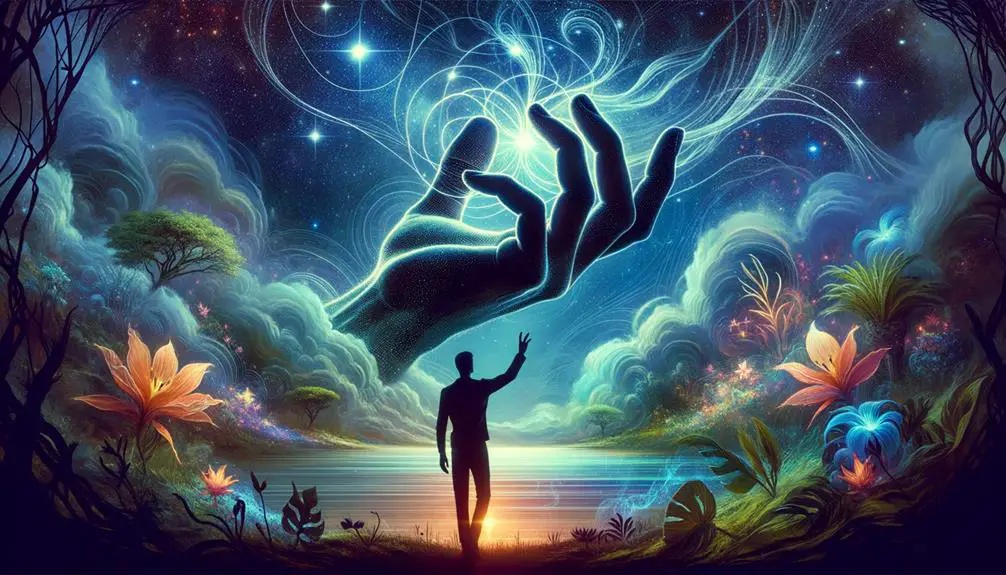
You must consider how the timing of man's creation in the Bible informs our understanding of divine purpose and human destiny.
By examining this moment, you're able to discern the broader theological narrative that defines humanity's role and end goals within a divine framework.
This exploration not only enriches our spiritual comprehension but also anchors our existential inquiries in a historical and scriptural context.
Divine Purpose Explored
Exploring the divine purpose behind the creation of man in the Bible reveals a multifaceted theological implication that demands careful analysis. This exploration unravels the depth of humanity's role within a divinely orchestrated universe, illuminating both ethical implications and the mandate for environmental stewardship.
- Ethical Implications: The Bible positions humans as moral agents, accountable for choices that affect both their lives and those of others.
- Environmental Stewardship: Scripture endows humanity with the responsibility to care for creation, highlighting a divine command towards sustainable living.
- Relationship with the Divine: It suggests a unique bond between Creator and creation, emphasizing human beings' role in reflecting divine attributes.
- Community and Fellowship: It underscores the importance of human relationships, advocating for a society built on compassion and mutual support.
This comprehensive approach invites a deeper understanding of our place and purpose within a divinely ordered cosmos.
Human Destiny Defined
Having considered the divine purpose behind humanity's creation, it's crucial to examine how the Bible outlines our ultimate destiny and its theological significance.
This exploration takes us beyond the evolution debate into the realms of free will and divine sovereignty. The scripture suggests that you aren't merely a product of evolutionary processes but are imbued with a free will, a gift that allows you to make moral choices and shape your destiny.
This concept reinforces the idea that your ultimate destiny isn't predetermined by genetic or environmental factors but is instead a journey shaped by personal decisions within the framework of divine guidance.
Thus, the theological implications of human destiny in the Bible emphasize the balance between divine predestination and human free will, offering a nuanced perspective on the purpose and end of human existence.
Modern Interpretations
Modern interpretations of the biblical timeline concerning human creation often reflect a complex interplay between faith, science, and historical understanding. Scholars and theologians alike scrutinize this topic with attention to both literal and metaphorical readings of the Genesis account. The inclusion of scientific evidence and cultural influences has undeniably shaped contemporary understandings, leading to a rich tapestry of interpretations that range from strictly traditional to more progressive viewpoints.
When examining modern interpretations, consider these key aspects:
- Scientific evidence: Advances in genetics, archaeology, and anthropology have provided insights that challenge traditional six-day creation narratives, suggesting a much older earth and a gradual process of human evolution.
- Cultural influences: The way societies understand the Genesis creation narrative is heavily influenced by prevailing cultural norms and historical contexts, leading to varied interpretations across different communities.
- Theological diversity: There's a wide spectrum of theological perspectives, from those who adhere to young Earth creationism to others who embrace theistic evolution, indicating God's guidance in the process of evolution.
- Literary analysis: A deeper look into the original Hebrew texts and their literary forms has encouraged some scholars to view the creation stories more as theological statements about God and humanity rather than strict historical accounts.
This analytical journey into the modern interpretations of when man was created according to the Bible reveals a dynamic dialogue between the ancient text and contemporary human understanding. It's a reminder of the enduring relevance and flexibility of these sacred narratives in the face of evolving knowledge and societal shifts.
Significance for Believers
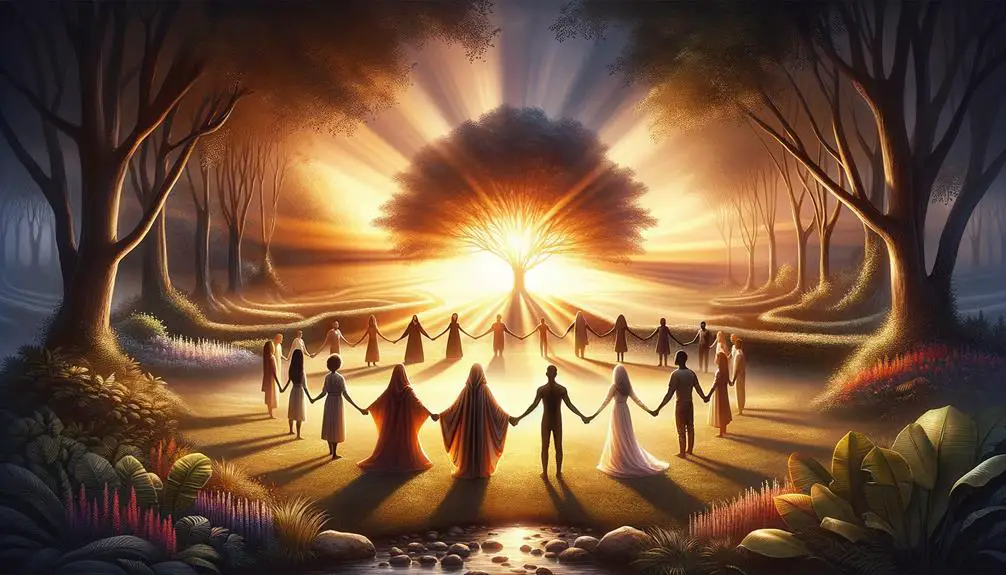
Reflecting on the myriad interpretations of human creation, it's crucial to consider the profound impact these views have on believers' faith and understanding of their place in the world. The way you perceive the creation narrative shapes not only your spiritual outlook but also your approach to ethical implications and moral responsibility. Understanding your origins according to the Bible can guide you in navigating the complex moral landscapes of contemporary life.
Aspect |
Emotional Impact |
Ethical Implications |
|---|---|---|
Divine Creation |
Awe and reverence for life |
Stewardship of the earth |
Literal Interpretation |
Certainty in faith's foundations |
Literal adherence to biblical morals |
Metaphorical Interpretation |
Openness to diverse truths |
Flexibility in ethical decision-making |
Historical Context |
Appreciation for tradition |
Understanding of moral evolution |
Scientific Integration |
Harmony between faith and reason |
Ethical innovation in a modern world |
This table helps to visualize the spectrum of beliefs and their implications for you as a believer. Whether you lean towards a literal understanding or a more metaphorical interpretation, each perspective carries weight in how you perceive your moral responsibility. The ethical implications of these beliefs are vast, influencing everything from how you interact with the environment to how you engage with modern scientific discoveries.
In essence, your interpretation of man's creation in the Bible is not just a matter of theological debate; it's a foundational aspect of your identity as a believer. It shapes your understanding of ethical living and moral responsibility in a world that is constantly evolving. This understanding is crucial in guiding your actions and decisions in a way that aligns with your faith.
Frequently Asked Questions
How Do Different Religious Traditions Outside of Christianity Interpret the Creation of Man?
You're exploring how various religious traditions view the creation of man.
Focusing on Islamic perspective and Hindu mythology.
Islam teaches that God created Adam, the first man, from clay and water.
Emphasizing a deliberate divine act.
Hindu mythology presents a more complex narrative with multiple versions.
Including the Purusha Sukta, where Purusha, a cosmic man, is sacrificed by gods to create the universe.
Both perspectives offer unique insights into the origins of humanity.
Are There Scientific Theories That Align or Conflict With the Biblical Timeline of Man's Creation?
Yes, there are several scientific theories that either align or conflict with the biblical timeline of man's creation.
The evolution debate is central to this discussion, with genetic evidence often contradicting the biblical account by suggesting humanity's origins date back much further.
While some theories propose a timeline that could potentially align with scripture, the majority of scientific findings support evolution, which significantly predates the biblical timeline for man's creation.
How Has the Concept of Man's Creation in the Bible Influenced Contemporary Environmental Ethics and Stewardship?
Your journey through the garden of environmental ethics reveals a deep-rooted branch: the Bible's narrative on creation has significantly shaped contemporary green theology and eco-spirituality. Analyzing this sacred canopy, it's clear that these religious frameworks advocate for stewardship and conservation, reflecting a divine mandate to protect our planet.
This scholarly analysis uncovers how biblical teachings haven't just lingered but evolved, inspiring a moral imperative towards environmental stewardship in today's world.
What Role Does the Creation of Man in the Bible Play in Popular Culture, Such as Movies, Literature, and Art?
In popular culture, the creation of man in the Bible influences movies, literature, and art through cinematic adaptations and artistic symbolism.
You'll find these themes woven into narratives, offering a rich tapestry of interpretations and questions about humanity's origin and purpose.
Cinematic adaptations often re-imagine these stories, while artistic symbolism in literature and art explores deeper meanings, reflecting society's ongoing fascination and engagement with this seminal biblical event.
How Do Feminist and Gender Studies Critique or Interpret the Narrative of Man's Creation in the Bible?
In feminist and gender studies, about 75% of scholars critique the Bible's creation narrative for its patriarchal narratives, emphasizing how these frameworks marginalize women. They highlight the lack of Eve's agency and autonomy, arguing that traditional interpretations reinforce gender hierarchies.
Conclusion
So, after trudging through ancient texts, debating the nitty-gritty of the sixth day, and navigating a sea of scholarly opinions, you've finally reached the end.
Turns out, pinpointing the exact moment of man's creation in the Bible is like trying to nail jelly to a wall – a delightful exercise in futility. But hey, it's the journey, not the destination, right?
As believers and skeptics alike scratch their heads, the tale of creation remains a fascinating puzzle, its significance undiminished by the whims of time.

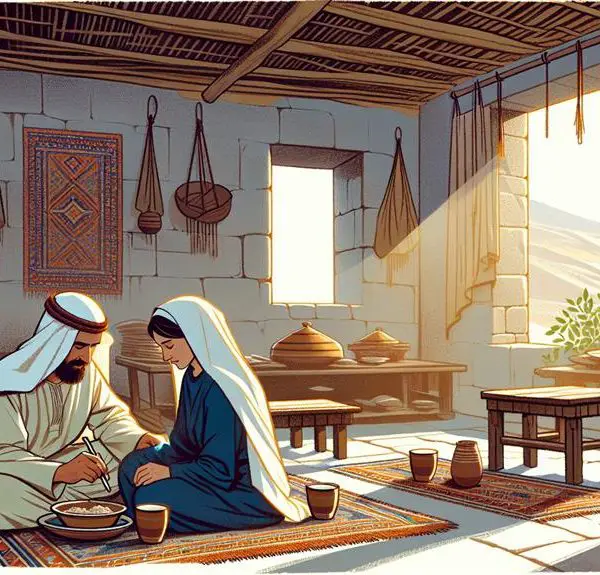
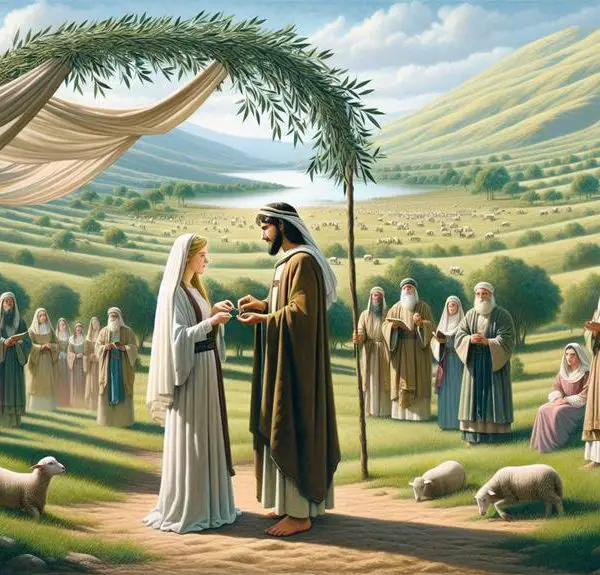
Sign up